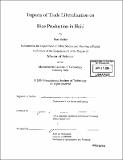Impacts of trade liberalization policies on rice production in Haiti
Author(s)
Altidor, Paul, 1972-
DownloadFull printable version (1.332Mb)
Other Contributors
Massachusetts Institute of Technology. Dept. of Urban Studies and Planning.
Advisor
Alice Amsden.
Terms of use
Metadata
Show full item recordAbstract
The decline in rice production in Haiti corresponds directly with the trade liberalization that began during the mid 1980s. Before 1986, Haiti was self-sufficient in rice production even in the midst of low yields and traditional farming practices. An influx of rice imports from the United States priced lower than domestic rice has slowly displaced Haitian rice. Producers have found that they are unable to compete with the cheaper imported rice. The low tariffs on rice in Haiti prevent Haitian producers from being able to compete with lower priced imported rice. In 1995, tariffs on rice were decreased from 35 percent to 3 percent. The majority of the rice imported into Haiti originated from the United States, where farmers receive heavy subsidies from the government. As a result, the price of the imported rice does not reflect true production costs. Since Haitian producers are not subsidized, Haitian producers are at disadvantage.
Description
Thesis (S.M.)--Massachusetts Institute of Technology, Dept. of Urban Studies and Planning, 2004. Includes bibliographical references (leaves 37-39).
Date issued
2004Department
Massachusetts Institute of Technology. Department of Urban Studies and PlanningPublisher
Massachusetts Institute of Technology
Keywords
Urban Studies and Planning.